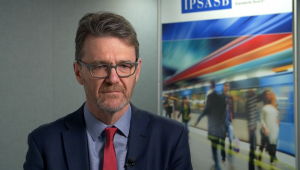Speaking at an event around the next steps for the accounting method, hosted by the bank, the International Monetary Fund and IPSASB earlier this week, Brumby questioned whether “collective action” between different organisations and governments is generating the traction and commitment it could.
“There are ways of changing the decision making within countries to make them more susceptible to adopting policies that are likely to be in the public good,” he said. “One of the important players in that is the international community.
“To get actors to act you need commitment, coordination and cooperation,” he continued, asking whether a global effort such as that seen with BEPs – the international anti-tax avoidance project coordinated by the OECD – was needed.
He described the lack of information on the financial situation of governments in countries like China as a “real concern” considering the importance of such economies to the global economy.
Speaking alongside Brumby, other officials from the World Bank and International Monetary Fund stressed the importance of accrual information for strong public financial management.
Svetlana Klimenko, lead financial management specialist at the World Bank, highlighted the role of accrual accounting, particularly IPSAS, in the management of public investment programmes. Afterwards, her colleague Ian Hawkesworth, a senior public sector specialist at the bank, discussed the fiscal risks involved in public-private partnerships.
This topic was also picked up by Sudarshan Gooptu, global lead on fiscal policy, macroeconomics and fiscal management at the World Bank. He noted the risks posed by contingent liabilities in PPPs, state-owned enterprises or unexpected events such as natural disasters.
Gooptu stressed that when realised, these contingent liabilities can be very costly for the public purse and accrual concepts are vital to managing the risk they pose.
Tools, such as IPSAS or the IMF’s fiscal transparency assessment, that “go beyond estimating aggregate fiscal risk” and provide a more granular view of the network of assets and liabilities throughout the public sector are needed, he said.
But, he continued, disclosure needs to lead to the direct fiscal impacts of these being estimated and incorporated before risks are realised. For this to happen, he said, economists and accountants need to work more closely together – a theme picked up on by a number of speakers throughout the day.
Following Goopta, Amanda Sayeghm, an economist in the IMF’s fiscal affairs department, also highlighted that, while many countries produce balance sheets, a number of elements – PPPs, contingent liabilities, civil service pensions or the risks related to financial assets – were missing.
As well as being incomplete, the balance sheets were not always used for fiscal or risk analysis, she continued and, as a result, the management benefits were limited.
She highlighted a number of ways to increase their use as a tool, including: moving away from debt and deficit figures to fiscal targets linked to the balance sheet; taking the risks identified into account in, for example, deficits; and stress testing.
The limited use of such information could be one factor in an observation made by the World Bank’s Brumby: “What worries me a bit is that we have more information, more sophisticated approaches ... but actually our outcomes are not necessarily going in the right direction.”
As well as limited collective action, Brumby said “complexity may be a problem”.
“Some of the concepts don’t apply very well,” he said. “Which means the complexity of the communication we are left with ... is very high.”
Also touching on the differences in how economists and accountants approach financial information, he highlighted the diversity in language use, with disparate disciplines understanding terms such as “contingent liability” differently, and there being little recognition of this diversity.
Some perceive the contrasting approach and outlook of economists and accountants as frustrating efforts towards sounder public financial management.
While Brumby agreed it threw up some “thorny issues”, he and other speakers stressed it “need not be a drag” on progress if the two professions worked towards better communication and coordination to bridge the gap between them.














